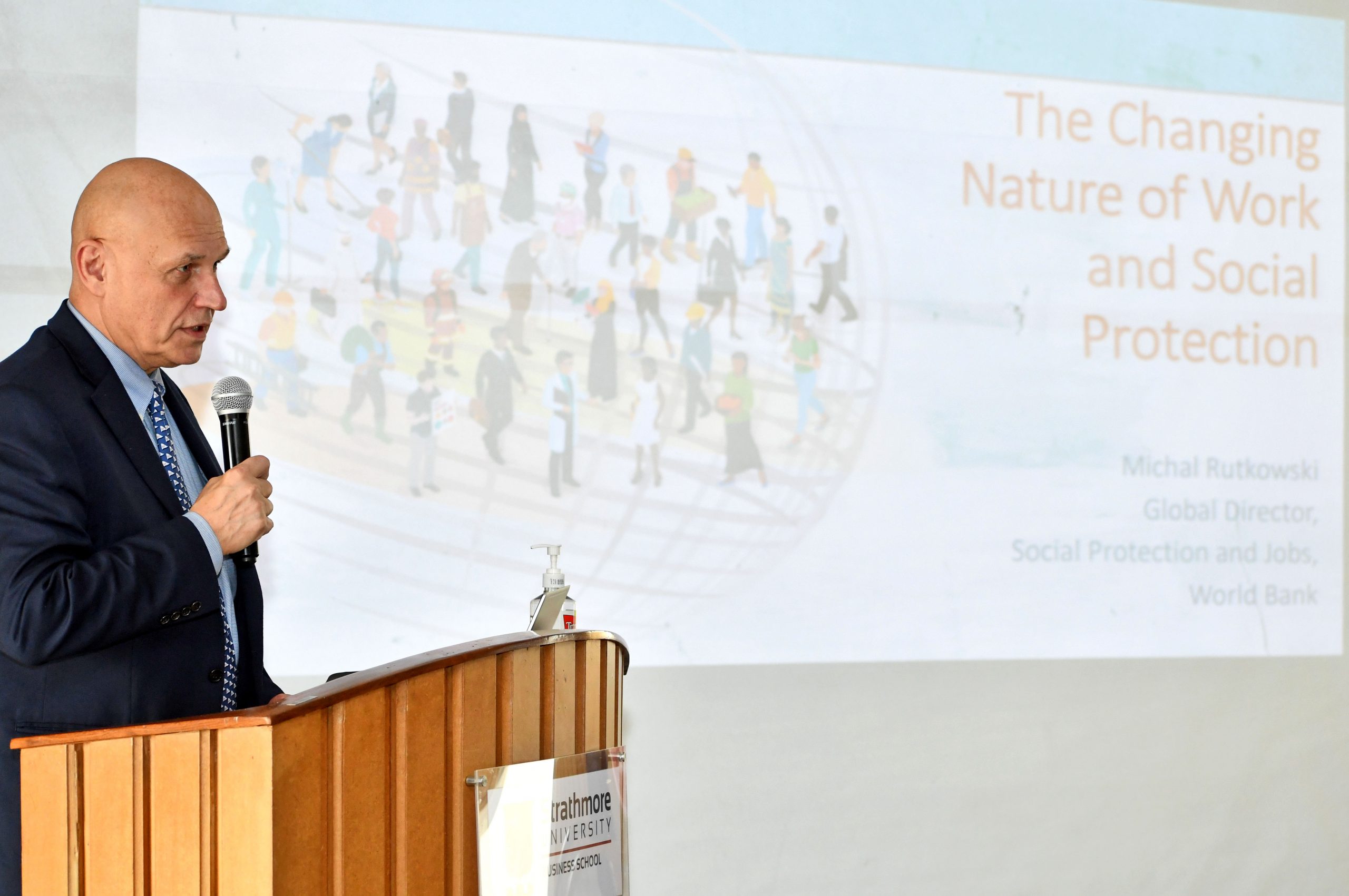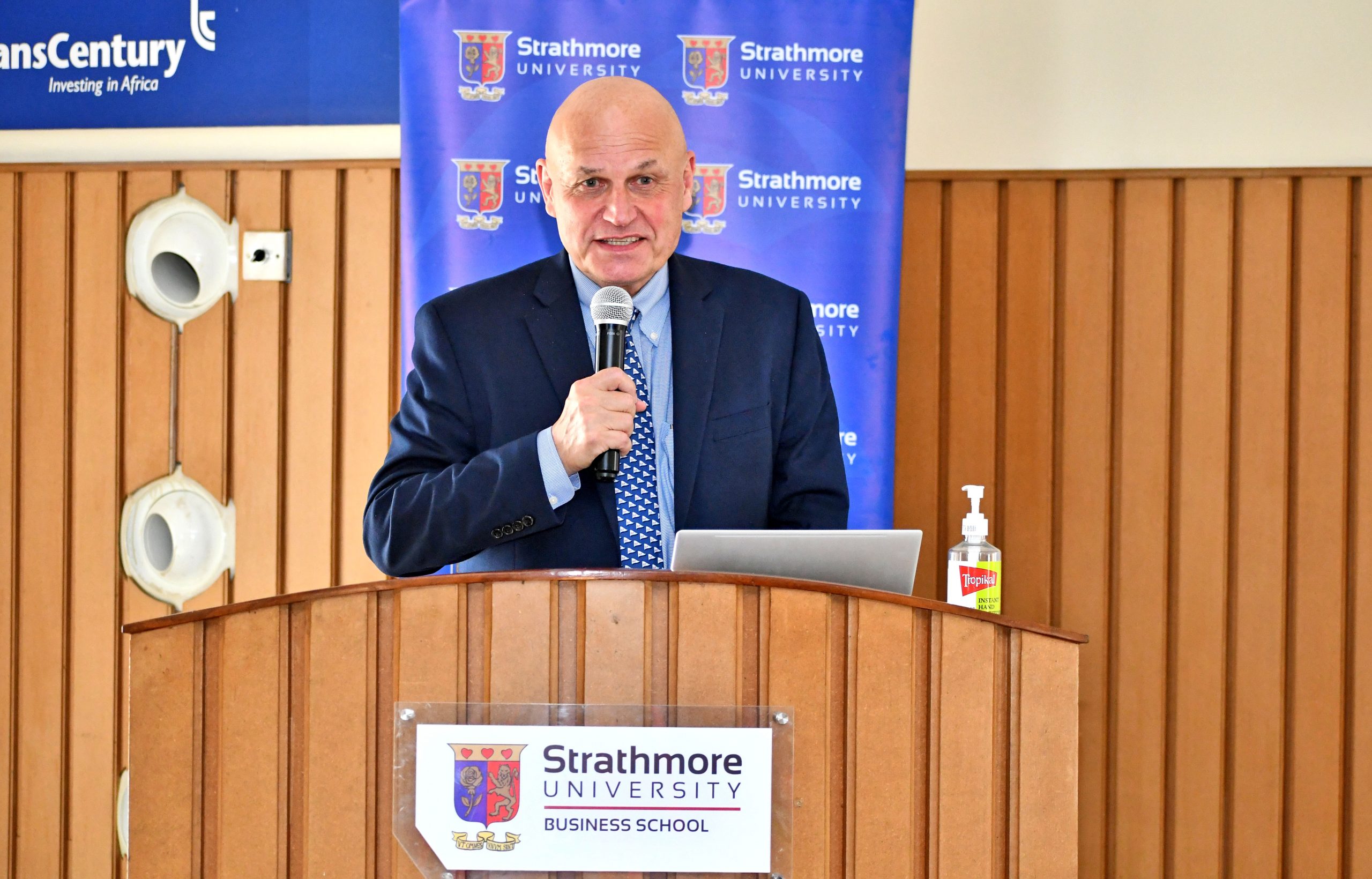The nature of work has changed dramatically over the last decade. Technological progress has reshaped traditional production patterns and digital transformation has irrevocably altered the way companies do business. The COVID-19 pandemic acted as a catalyst for the adoption of digital technology and also changed work patterns globally. Researchers and academics are studying the trends and assessing the impact these work patterns will have on the labour market and social protection schemes.
Strathmore University recently hosted Michal Rutkowski, the Global Director for Social Protection and Jobs at the World Bank to share insights on the changing nature of work and social protection and what implications these factors have on the Sub-Saharan African labour market. Mr. Rutkowksi explained that over the last three years, severe repeated crises have affected the poorest people in Africa. There has been slow COVID-19 economic recovery in the region and the worst drought in 40 years has threatened approximately 13 million people in Kenya, Somalia and Ethiopia. The Ukraine war has had a ripple effect that has raised the cost of fuel, food prices, fertiliser, and raw materials. Further, the region continues to be fragile due to the different political contexts that have even led to some displacement. Unfortunately, existing social protection systems do not have adequate coverage of the poor and budgets are not released in a timely manner in response to crises. The majority of the African population does not have access to adequate health care and infant mortality is at its highest. The continent also has the lowest coverage of social security. The deficit between social security needs and the capacity to meet those needs is a glaring problem that cannot be ignored.
With approximately 60 per cent of Africa’s population under the age of 25, the continent has the world’s youngest population. For countries that are at the vanguard of Africa’s fertility transitions such as South Africa that have fewer children, families are able to devote more resources to each child. Additionally, women empowerment will also lead to lower fertility rates. In a few Sub-Saharan African countries, demographic dividends have started to accrue and in order for this to continue, there needs to be swift, steady and broad-based declines in fertility, continued incentives to invest in education and economic growth and jobs creation.
From an academic perspective, Dr. Elizabeth Gachenga, the Deputy Vice Chancellor, Academic and Student Affairs, stated that the mission of Strathmore University is to serve society through research, innovation, education and social impact projects. She went on to explain that the University always strives to prepare graduates for the future and works with government partners, the private sector development partners and policy makers to engage in projects that help shape a better future for the next generation. Additionally, the students at Strathmore University engage in service-based learning and are sensitised on societal problems so that they can contribute in building a prosperous and sustainable Africa by solving some of the complex problems that the continent faces.
Prevailing social protection policies assume that most people are in standard employment. Approximately 63 to 70 per cent of urban African workers are considered to be informal and the vast majority of workers in the rural areas are categorised as informal workers. The majority of these workers are not well educated. Furthermore, only 15 per cent of the formal wage employees work in the private sector. In Sub-Saharan Africa, informal employment is prevalent in most countries, even outside of the agricultural sectors. Does Africa have the capacity to adapt to requirements of future jobs? There needs to be a renewed focus on closing the continent’s skills gap through education, staff training systems, investment in technology, local economic diversification and reduction in unemployment rates.
Social protection programs in Africa are still in their infancy and although most countries have initiated social safety net programs, their coverage remains inadequate and only accessible to a small proportion of workers. The exclusion of the poorest people persists and levels of assistance during crises need to be boosted for these vulnerable people. Although the COVID-19 pandemic did result in most countries scaling up their social protection programs, these investments did not translate into substantial impact.
Despite these challenges, there are still many untapped opportunities for the African continent. There are 11 million youth entering the labour market each year. These new generations are more tech-savvy and adaptable than older generations. Strengthening regional integration and trade can also help Sub- Saharan Africa realise its potential as an economic powerhouse as well as improving connections to global and regional value chains. The continent is embracing innovation and technological change, which can be adopted by entrepreneurs to boost productivity and create jobs.
According to Mr. Rutkowski, for the African labour market to remain relevant in a global context, some foundational assumptions need to shift. He explained that Africa has a smaller manufacturing base and automation is not likely to displace workers in the next few years as previously alleged. Service-led growth may be very promising in the near future. The adoption of digital technologies will help businesses reduce their costs and prices and enable them to expand their production and employment across all sectors. Increased accessibility to internet and mobile apps will also help low-skilled workers to learn better practices, access markets and sell more effectively. The skill-sets required in most traditional and emerging occupations are rapidly changing, as are the soft skills required for success. Some of the key skills that need to be cultivated are: analytical thinking, innovation, creativity, technology design and programming, complex problem solving, emotional intelligence, resilience, and stress tolerance.
Policy makers need to understand that the jobs in the informal sector are not going to transform into formal jobs, they are here to stay. However, the emphasis should be placed on making these jobs more productive. Governments should prioritise the needs of the poorest people before expanding coverage to other households. The foundation of the new social contracts should be poverty prevention and subsidised protection from catastrophic events that are financed by broad-based taxes. Digital technologies can be leveraged to mobilise these tax resources and deliver protection more efficiently and equitably. The social protection model that applied to most Western countries cannot be applied to Africa as there is no trend towards formalisation of the informal sector. The world of work is very diverse. It is incumbent upon Africans to understand their unique differences as a society and work towards instituting reforms that make sense in the local context to protect their vulnerable populations and work towards creating a more equitable and prosperous future for themselves.
Article by Shailja Sharma, Executive Fellow and Coach
Share This Story, Choose Your Platform!
Your journey to business excellence starts here. Subscribe today and be at the forefront of innovation and leadership.











